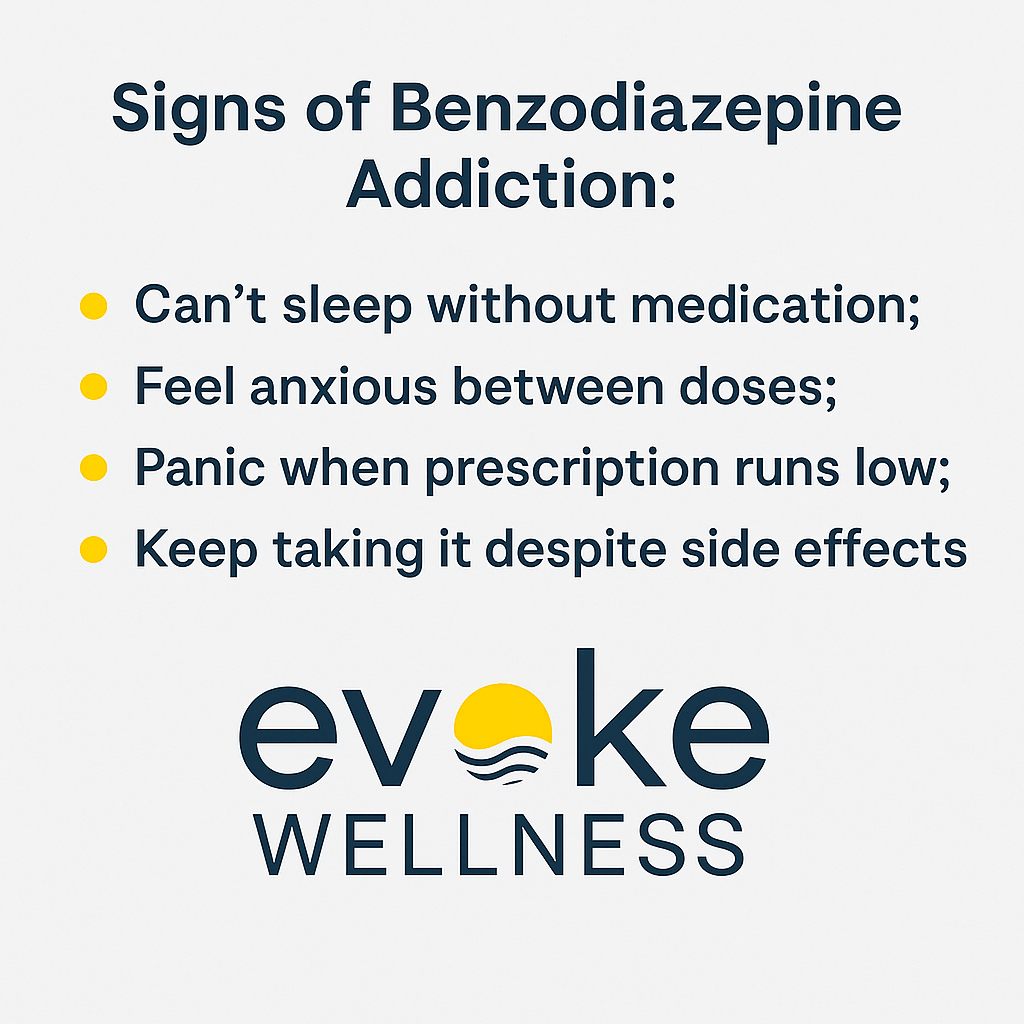What if the medication you trust the most is the one quietly holding you hostage?
That’s the dilemma facing many high-functioning adults who use benzodiazepines—commonly known as benzos—for anxiety, sleep, or panic symptoms. These medications are effective. They’re also highly addictive. And when someone’s life looks “together” on the outside, it’s easy to dismiss growing dependence as manageable. After all, the meds are prescribed. You’re not abusing them. So what’s the problem?
Here’s the truth: addiction doesn’t always look like chaos. Sometimes it looks like control.
Benzodiazepines Work—Until They Don’t
Benzodiazepines like Xanax (alprazolam), Ativan (lorazepam), Klonopin (clonazepam), and Valium (diazepam) are fast-acting tranquilizers that enhance the effects of GABA, a brain chemical that calms nervous system activity. They’re often prescribed for:
- Generalized anxiety
- Panic attacks
- Acute stress reactions
- Insomnia
- Muscle spasms
At first, they’re a relief. The panic quiets. Sleep returns. You feel in control again.
But the brain adapts quickly. Over time, the same dose doesn’t hit the same way. You might start taking it more frequently—or feel shaky and anxious if you don’t. You’re not trying to misuse it. But your body is already adapting. That’s the beginning of dependence.
“I Use It Responsibly”—But Is It Still Addiction?
Many high-functioning adults tell us the same thing: “I’m not abusing it. I’m using it exactly as prescribed.”
That may be true. And still—addiction can develop under the radar. Here’s the difference:
- Dependence is physical. Your body needs the drug to feel normal. Stopping causes withdrawal.
- Addiction includes behavioral changes—compulsion, cravings, preoccupation, and negative consequences.
The truth is, benzodiazepine addiction often begins with dependence. You may notice:
- You can’t sleep without your meds.
- You feel more anxious between doses than you did before starting.
- You panic when your prescription runs low.
- You keep taking it even though it’s fogging your memory or draining your energy.
These are not moral failings. They’re warning signs. And they’re common—especially for high-functioning people who rely on the meds to keep pace with demanding lives.
Why High-Functioning Adults Miss the Red Flags
Addiction doesn’t always mean chaos. For professionals, caregivers, and busy adults juggling multiple roles, the warning signs of benzodiazepine addiction are often masked by routine.
Here’s what we often hear:
- “I can’t afford to fall apart.”
- “If I stop, everything will unravel.”
- “I don’t have time for treatment.”
We understand. And we also know: untreated benzo addiction doesn’t stay hidden forever. Over time, it erodes memory, decision-making, emotional regulation, and physical health. What starts as functional begins to fray.
The truth? You don’t have to wait for a breakdown. You can get help quietly, safely, and with dignity—before things fall apart.
The Danger of Going Off Benzos Cold Turkey
Benzodiazepine withdrawal is different from many other substances. Quitting cold turkey can be not only miserable but medically dangerous. Symptoms may include:
- Severe anxiety or panic
- Muscle stiffness or spasms
- Nausea or vomiting
- Insomnia or vivid nightmares
- Heart palpitations
- Sensory disturbances
- Seizures
In short: this isn’t something to white-knuckle your way through. You don’t need to suffer in silence, and you shouldn’t attempt withdrawal alone.
At Evoke Wellness Ohio, we offer medically supervised benzo detox that supports both safety and dignity. Located in Columbus, OH, our program is discreet, compassionate, and tailored for people who need recovery to fit within a functioning life—not a broken one.
Real Recovery Looks Different for Everyone
Benzodiazepine addiction can feel uniquely shameful because it’s tied to something that once helped. That shame keeps people stuck longer than necessary. But there is a way out—and it doesn’t involve losing everything.
At Evoke Wellness Ohio, our benzo addiction treatment program focuses on:
- Medically supervised detox with 24/7 support
- Personalized care plans that account for your work and family life
- Evidence-based therapy for anxiety and trauma
- Alternatives to benzos for long-term emotional regulation
- Aftercare planning that keeps you supported post-treatment
We work with you. At your pace. With your goals in mind.
You’re not “too functional” for treatment. And you don’t have to wait until your life collapses to reclaim it.
FAQ: Benzodiazepine Addiction & Recovery
What makes benzos so addictive?
Benzos act fast and create a sense of calm quickly. But the brain builds tolerance fast, and withdrawal symptoms—especially anxiety and sleep issues—create a cycle of needing the drug to function. That cycle is what drives addiction.
How do I know if I’m addicted vs. just dependent?
Dependence is physical—you may need the medication to feel normal. Addiction includes psychological and behavioral signs like cravings, using despite negative effects, or preoccupation with when you’ll take it next. Many high-functioning adults experience both without recognizing it.
Can I just taper off slowly on my own?
Tapering should always be done with medical oversight. Even slow tapers can trigger dangerous symptoms, including seizures. A supervised detox ensures safety and comfort—and dramatically lowers the risk of relapse.
Will I lose my job or routine if I go to treatment?
No. Our programs are built to support working professionals, caregivers, and high-functioning adults. We’ll work with your schedule, responsibilities, and privacy concerns to create a plan that fits.
Is there a stigma around getting help for prescription drugs?
Unfortunately, yes—but it’s shrinking. What’s growing is the awareness that benzo addiction can affect anyone. Getting help isn’t weakness—it’s an informed, proactive choice to protect your health and future.
You Deserve Relief That Doesn’t Come With a Price
If you’re starting to wonder whether your anxiety meds are doing more harm than good, trust that instinct. There’s no shame in needing help. There’s only danger in pretending you don’t.
Call us at (866) 430-9267 to talk confidentially about your options—or explore our Benzo Addiction Treatment Program in Columbus, Ohio. You don’t have to wait for a crisis. You just have to be ready to stop doing this alone.



